Diverse projects created from sunflower fields and the spirit of mutual consideration
Increasing the number of collaborators with materials conveying the philosophy and scope of the activities
Diverse projects created from sunflower fields and the spirit of mutual consideration
Increasing the number of collaborators with materials conveying the philosophy and scope of the activities
Specified Non-profit Corporation - Team Fukushima
Specified Non-profit Corporation - Team Fukushima

Team Fukushima has been encouraging Fukushima with “sunflowers,” which are a symbol of the reconstruction and recovery. A pro bono team of Panasonic employees worked on the creation of materials to provide an overview of their projects, which had expanded the scope of their support and become more diversified.
[Re-edited from contents published in "THE BIG ISSUE JAPAN" Edition No. 474 (issued on March 1, 2024)]
Team Fukushima has been encouraging Fukushima with “sunflowers,” which are a symbol of the reconstruction and recovery. A pro bono team of Panasonic employees worked on the creation of materials to provide an overview of their projects, which had expanded the scope of their support and become more diversified.
[Re-edited from contents published in "THE BIG ISSUE JAPAN" Edition No. 474 (issued on March 1, 2024)]
550,000 people nationwide have become foster parents for sunflowers Creating jobs for welfare workshops with seeds
550,000 people nationwide have become foster parents for sunflowers Creating jobs for welfare workshops with seeds
One of the beginnings of Team Fukushima's activities was in 2008. Shinji Handa, who ran a training company, used to go to children’s homes as a volunteer and perform magic tricks, which was his hobby. While there, he heard that the loneliest day for the children is December 29th, when the children are divided into those who can go home temporarily and those who cannot. In response, he created a training theme called "the session to learn from the children" and planned a meeting to interact with children at the facility on this day every year.
He explained that "Sometimes the gathering of considerate company managers at those sessions led to the children gaining employment or being adopted. That's why we started an initiative to connect young people with companies that are easy to work for and have potential."
One of the beginnings of Team Fukushima's activities was in 2008. Shinji Handa, who ran a training company, used to go to children’s homes as a volunteer and perform magic tricks, which was his hobby. While there, he heard that the loneliest day for the children is December 29th, when the children are divided into those who can go home temporarily and those who cannot. In response, he created a training theme called "the session to learn from the children" and planned a meeting to interact with children at the facility on this day every year.
He explained that "Sometimes the gathering of considerate company managers at those sessions led to the children gaining employment or being adopted. That's why we started an initiative to connect young people with companies that are easy to work for and have potential."
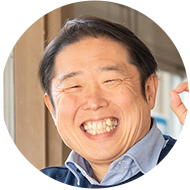
Team Fukushima
Shinji Handa, President
Team Fukushima
Shinji Handa, President
It was right in the midst of those activities when the Great East Japan Earthquake struck in March 2011.
"As proprietors of businesses in Fukushima Prefecture, we took the lead in activities using seeds from sunflowers, which are the symbol of reconstruction and recovery. We had the seeds put in bags by disabled people who had worked at welfare workshops but lost their jobs, and then sent the seeds to foster parents (purchasers of seeds) nationwide. This was when we started the ‘Fukushima Sunflower Foster Parent Project,’ which is where we have the foster parents collect seeds from the sunflowers that have grown and send them to Fukushima, where we create sunflower fields around the prefecture to promote tourism."
Mr. Handa is from Hiroshima and the future he envisions is a future where Fukushima becomes like Hiroshima, which experienced the atomic bombing and revived strongly. This is a future where Fukushima attracts attention after being rebuilt with the help of people and becomes a tourist destination that welcomes people from all over the world.
The project grew to the point where more than 550,000 people had joined as foster parents nationwide, and the organization was turned into an NPO to stabilize its activities.
It was right in the midst of those activities when the Great East Japan Earthquake struck in March 2011.
"As proprietors of businesses in Fukushima Prefecture, we took the lead in activities using seeds from sunflowers, which are the symbol of reconstruction and recovery. We had the seeds put in bags by disabled people who had worked at welfare workshops but lost their jobs, and then sent the seeds to foster parents (purchasers of seeds) nationwide. This was when we started the ‘Fukushima Sunflower Foster Parent Project,’ which is where we have the foster parents collect seeds from the sunflowers that have grown and send them to Fukushima, where we create sunflower fields around the prefecture to promote tourism."
Mr. Handa is from Hiroshima and the future he envisions is a future where Fukushima becomes like Hiroshima, which experienced the atomic bombing and revived strongly. This is a future where Fukushima attracts attention after being rebuilt with the help of people and becomes a tourist destination that welcomes people from all over the world.
The project grew to the point where more than 550,000 people had joined as foster parents nationwide, and the organization was turned into an NPO to stabilize its activities.
Mr. Handa explains that "The people who supported us taught us the spirit that 'in times of need, we should help each other.' It was from the desire to pass that kindness on to the next generation that we started a project called 'Otagai-sama Town Fukushima' (Helping Each Other Town Fukushima) from 2022."
This is a “pay-forward” system, where people paying at a registered restaurant or store can buy an "Otagai-sama Ticket" for somebody else, and then the user of that ticket can purchase items for free or at a low price. More than 55 shops and facilities within and outside the prefecture have joined the project.
Mr. Handa explains that "The people who supported us taught us the spirit that 'in times of need, we should help each other.' It was from the desire to pass that kindness on to the next generation that we started a project called 'Otagai-sama Town Fukushima' (Helping Each Other Town Fukushima) from 2022."
This is a “pay-forward” system, where people paying at a registered restaurant or store can buy an "Otagai-sama Ticket" for somebody else, and then the user of that ticket can purchase items for free or at a low price. More than 55 shops and facilities within and outside the prefecture have joined the project.
Another initiative is called the "HIMAWARI Community Fridge." This provides food and daily necessities donated by individuals and companies to struggling families raising children and students receiving scholarships. The users can pick up items without embarrassment in unattended warehouse space that is electronically locked and only accessible to registered users. Mr. Handa explains that "We ask disabled people in the welfare workshop to organize and clean the warehouse space as a job, so people using the system are also supporting that employment."
Another initiative is called the "HIMAWARI Community Fridge." This provides food and daily necessities donated by individuals and companies to struggling families raising children and students receiving scholarships. The users can pick up items without embarrassment in unattended warehouse space that is electronically locked and only accessible to registered users. Mr. Handa explains that "We ask disabled people in the welfare workshop to organize and clean the warehouse space as a job, so people using the system are also supporting that employment."
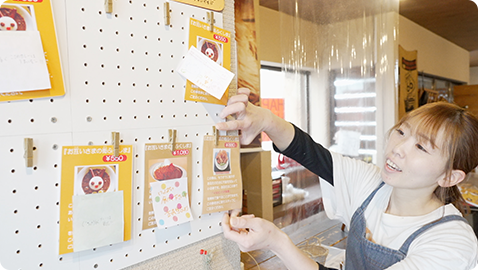
More than 55 establishments participate
in the "Otagai-sama Tickets"
More than 55 establishments participate
in the "Otagai-sama Tickets"
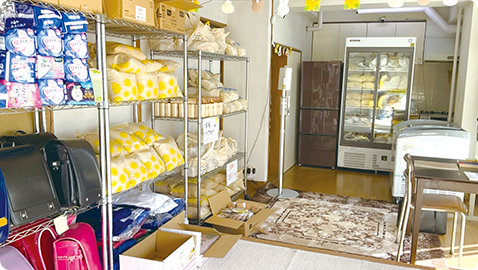
The "HIMAWARI Community Fridge"
provides food, etc., to people who need it
The "HIMAWARI Community Fridge"
provides food, etc., to people who need it
Interviews with staff and members
Representing the spread of activities in a map
Interviews with staff and members
Representing the spread of activities in a map
However, as the projects grew, certain issues also became apparent. A separate website had been created for each project, so it had become difficult to grasp an overall picture of the organization and understand the significance of its activities. To resolve this, Team Fukushima asked the pro bono team to create materials that can objectively describe the organization's philosophy and activities to any newly collaborating companies, schools, or administration officials.
In response, the five members of the pro bono team began their activities in September 2023. The goal was to prepare sales materials with contents that would enable people learning about Team Fukushima for the first time to understand its philosophy and overall picture, and make them also want to participate in the activities and support.
The pro bono team first organized the information from the websites and conducted individual interviews and questionnaires with Team Fukushima staff and members, participants who agree with the sentiment of the activities and cooperate with them, and volunteer participants. They asked these people about their feelings toward the organization. Investigations were also performed regarding other organizations that provide similar services, in order to determine the positioning of Team Fukushima in their field of activities. The materials summarized in this way were then used to give a final report online on January 30, 2024.
The materials are started with a diagram easy to understand when each project began, what kind of ideas they were based on, and what kind of work they were doing. This was expressed using the growth of a sunflower, which is the symbol. Specific details were introduced with a wealth of photographs and illustrations. The materials also summarized the philosophy underlying each of the Team Fukushima activities, which had been clarified by the interviews.
And then, the materials showed how people could get involved in each project, the procedure for actually participating, and links to the websites, and they displayed the nationwide spread of the activities in a map. In addition, in order to give people a sense of the benefits of participating in the activities, the materials included comments from participants such as, "It helped me expand my perspective and grow," and "It is possible to connect with like-minded people across the country." Finally, advice was given in a draft document to be used when calling for cooperation and participation by the authorities and companies, as well as recommendations on issues to be addressed in the future, such as ‘organizing the websites’ and ‘raising funds through customer management.’
However, as the projects grew, certain issues also became apparent. A separate website had been created for each project, so it had become difficult to grasp an overall picture of the organization and understand the significance of its activities. To resolve this, Team Fukushima asked the pro bono team to create materials that can objectively describe the organization's philosophy and activities to any newly collaborating companies, schools, or administration officials.
In response, the five members of the pro bono team began their activities in September 2023. The goal was to prepare sales materials with contents that would enable people learning about Team Fukushima for the first time to understand its philosophy and overall picture, and make them also want to participate in the activities and support.
The pro bono team first organized the information from the websites and conducted individual interviews and questionnaires with Team Fukushima staff and members, participants who agree with the sentiment of the activities and cooperate with them, and volunteer participants. They asked these people about their feelings toward the organization. Investigations were also performed regarding other organizations that provide similar services, in order to determine the positioning of Team Fukushima in their field of activities. The materials summarized in this way were then used to give a final report online on January 30, 2024.
The materials are started with a diagram easy to understand when each project began, what kind of ideas they were based on, and what kind of work they were doing. This was expressed using the growth of a sunflower, which is the symbol. Specific details were introduced with a wealth of photographs and illustrations. The materials also summarized the philosophy underlying each of the Team Fukushima activities, which had been clarified by the interviews.
And then, the materials showed how people could get involved in each project, the procedure for actually participating, and links to the websites, and they displayed the nationwide spread of the activities in a map. In addition, in order to give people a sense of the benefits of participating in the activities, the materials included comments from participants such as, "It helped me expand my perspective and grow," and "It is possible to connect with like-minded people across the country." Finally, advice was given in a draft document to be used when calling for cooperation and participation by the authorities and companies, as well as recommendations on issues to be addressed in the future, such as ‘organizing the websites’ and ‘raising funds through customer management.’
Roles that only Fukushima residents can play
Wanting to "pay forward" to people in Ishikawa Prefecture
Roles that only Fukushima residents can play
Wanting to "pay forward" to people in Ishikawa Prefecture
After completing the final report, the pro bono team members each gave their impressions of the activities. Masaya Nakatani commented that "This was my second time participating in pro bono. Last time, I supported an NPO in Nishinomiya City, my hometown. I am still participating in those activities and have now become a director of the NPO. If there is anything I can contribute to Team Fukushima, I would like to continue our exchanges". Yukari Kanbara, who is originally from the Tohoku region, commented that "Through the interviews, I was impressed by how the people were tackling the social issues as something that was their own problem. I am truly grateful for the reconstruction support." Yasue Kono explained that "I had been to Rikuzentakata before, but I hadn't been able to go to Fukushima, so I participated to learn more about society. I'm now planning to visit the Iwaki 3.11 Memorial and Revitalization Museum in March." Finally, Kenta Kawamura and Mizuho Hirai said that "This was my first pro bono session, the interviews on everyone's thoughts broadened my world."
After completing the final report, the pro bono team members each gave their impressions of the activities. Masaya Nakatani commented that "This was my second time participating in pro bono. Last time, I supported an NPO in Nishinomiya City, my hometown. I am still participating in those activities and have now become a director of the NPO. If there is anything I can contribute to Team Fukushima, I would like to continue our exchanges". Yukari Kanbara, who is originally from the Tohoku region, commented that "Through the interviews, I was impressed by how the people were tackling the social issues as something that was their own problem. I am truly grateful for the reconstruction support." Yasue Kono explained that "I had been to Rikuzentakata before, but I hadn't been able to go to Fukushima, so I participated to learn more about society. I'm now planning to visit the Iwaki 3.11 Memorial and Revitalization Museum in March." Finally, Kenta Kawamura and Mizuho Hirai said that "This was my first pro bono session, the interviews on everyone's thoughts broadened my world."
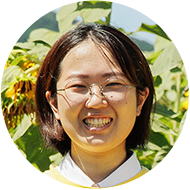
Team Fukushima staff member
Sayaka Yamada
Team Fukushima staff member
Sayaka Yamada
After receiving the final report, Team Fukushima staff member Sayaka Yamada expressed her gratitude, saying that "It has often been the case that the people participating in each activity only participate in that one activity. However, now we have materials that give an overview of the entire organization, it will be easier to introduce the activities, both to people who are new to them and to those who already know them."
After receiving the final report, Team Fukushima staff member Sayaka Yamada expressed her gratitude, saying that "It has often been the case that the people participating in each activity only participate in that one activity. However, now we have materials that give an overview of the entire organization, it will be easier to introduce the activities, both to people who are new to them and to those who already know them."
Mr. Handa, who is the president of the organization, expressed his enthusiasm, saying "This made me realize that the organization still has room to grow and that wonderful people are involved in the activities. I want to spread the 'HIMAWARI Community Fridge' as a model of linking good fortune, where the people who used to be supported become the supporters, so I want to make use of these materials."
With reference to the Noto Peninsula earthquake in January, President Handa also told us his outlook, saying that "In order to prevent awareness of the disaster fading away, in 2021, we established a system of certification called the Himawari Disaster Prevention Certificate, and we have been conducting our own activities for disaster prevention and mitigation. I think there is a role we are uniquely able to play as people who have experienced disaster as residents of Fukushima. I would therefore like to do things such as develop the 'Sunflower Foster Parent Project' in Ishikawa Prefecture, and support products from Ishikawa Prefecture with the 'Otagai-sama Tickets,' so that this time we can repay kindness by paying it forward to Ishikawa Prefecture".
Mr. Handa, who is the president of the organization, expressed his enthusiasm, saying "This made me realize that the organization still has room to grow and that wonderful people are involved in the activities. I want to spread the 'HIMAWARI Community Fridge' as a model of linking good fortune, where the people who used to be supported become the supporters, so I want to make use of these materials."
With reference to the Noto Peninsula earthquake in January, President Handa also told us his outlook, saying that "In order to prevent awareness of the disaster fading away, in 2021, we established a system of certification called the Himawari Disaster Prevention Certificate, and we have been conducting our own activities for disaster prevention and mitigation. I think there is a role we are uniquely able to play as people who have experienced disaster as residents of Fukushima. I would therefore like to do things such as develop the 'Sunflower Foster Parent Project' in Ishikawa Prefecture, and support products from Ishikawa Prefecture with the 'Otagai-sama Tickets,' so that this time we can repay kindness by paying it forward to Ishikawa Prefecture".

The members of the pro bono team and Team Fukushima after the final proposal
The members of the pro bono team and Team Fukushima after the final proposal
Specified Non-profit Corporation - Team Fukushima
Specified Non-profit Corporation - Team Fukushima
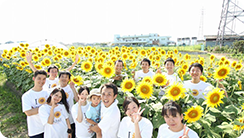
An organization that works based on the philosophy of "For you for Japan" (what is good for you is good for Japan) and "For you for next" (what is good for you is good for the next generation) and is developing three projects as support for reconstruction and the resolution of social issues, and to contribute to the well-being of workers and communities.
An organization that works based on the philosophy of "For you for Japan" (what is good for you is good for Japan) and "For you for next" (what is good for you is good for the next generation) and is developing three projects as support for reconstruction and the resolution of social issues, and to contribute to the well-being of workers and communities.

